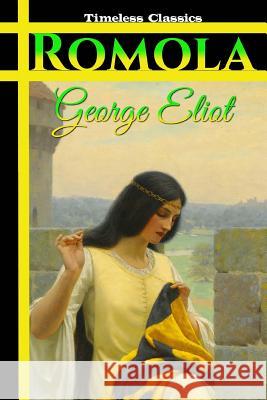Romola » książka
Romola
ISBN-13: 9781539174875 / Angielski / Miękka / 2016 / 488 str.
Romola
ISBN-13: 9781539174875 / Angielski / Miękka / 2016 / 488 str.
(netto: 100,05 VAT: 5%)
Najniższa cena z 30 dni: 99,67 zł
ok. 13-18 dni roboczych.
Darmowa dostawa!
Classics for Your Collection:
goo.gl/U80LCr
---------
Renaissance Florence. Ending of the 15th Century - beginning of the 16th. A space where people like Girolamo Savonarola, Niccolo Machiavelli and the Medicis are the everyday pawns of an ongoing and complicated reality. Politics handled with ability and shrewdness, religion used for political ends and social movements are displayed with great talent in the background, while in the first plan we witness together with the omniscient author the path of an individual to fame brought by corruption and treachery.
In this context of great actuality, the main character, Romola, with a majestic stature and the countenance of a Goddess, experiences love and disappointment and copes with all the good and bad coming her way with the strength of a superior character.
Tito, a young Greek whose handsomeness is striking, has to face the consequences of a choice that is morally wrong and instead of trying to get redemption, he convinces himself that what he chose was the right thing, the thing that anyone in his right mind would have done. His secret pushes him to lie further and further and get deeply immersed in a world of corruption, lies and treachery.
Romola, the wife he chose because he thought he loved her at the beginning when his morality was still intact, has an integrity and moral strength that is a constant reminder to him of what he has done wrong.
And, because he would rather appear flawless in the eyes of the community and attempt to get higher and higher in social status, he prefers to never confess to his wife the truth of his shallow choice from the past and creates a wall between them, adding a stone to it with every new deed. He is a Dorian of Florence, but the flawless attractive version looking in the mirror, and his only real reflection is in Romola's consciousness while discovering that he is not what he pretends to be.
He avoids the past with fierceness, he runs from it, but he cannot get rid of it as the past follows him like his own shadow. The person whom he has wronged most and keeps on morally hurting, becomes his biggest enemy.
He pulls the political strings in his favor continually and although he is really skilled at that he ends up his efforts in an unexpected way. His other wife, a young cherubic and innocent blue-eyed "Contadina" with his two children are saved by Romola whose superiority of character is once again proved this way. The ending, the story she tells to Tito's little son, Lillo, is the advice no one has ever given to Tito and it makes us wonder if his son will be the same as Tito was (pursuing the pleasure) or if he will listen to Romola's advice.
Romola marks a significant shift in George Eliot's career.
An amazingly well written book and Eliot crafts a fascinating, first-rate historical fiction plot based in Florence, Italy, from the death of Lorenzo de' Medici (in 1492), through the time of Savonarola's influence, and culminating in an epilogue placed in 1509.
Scroll Up and Get Your Copy
Timeless Classics for Your Bookshelf
Classic Books for Your Inspiration and Entertainment
Visit Us at:
goo.gl/0oisZU











